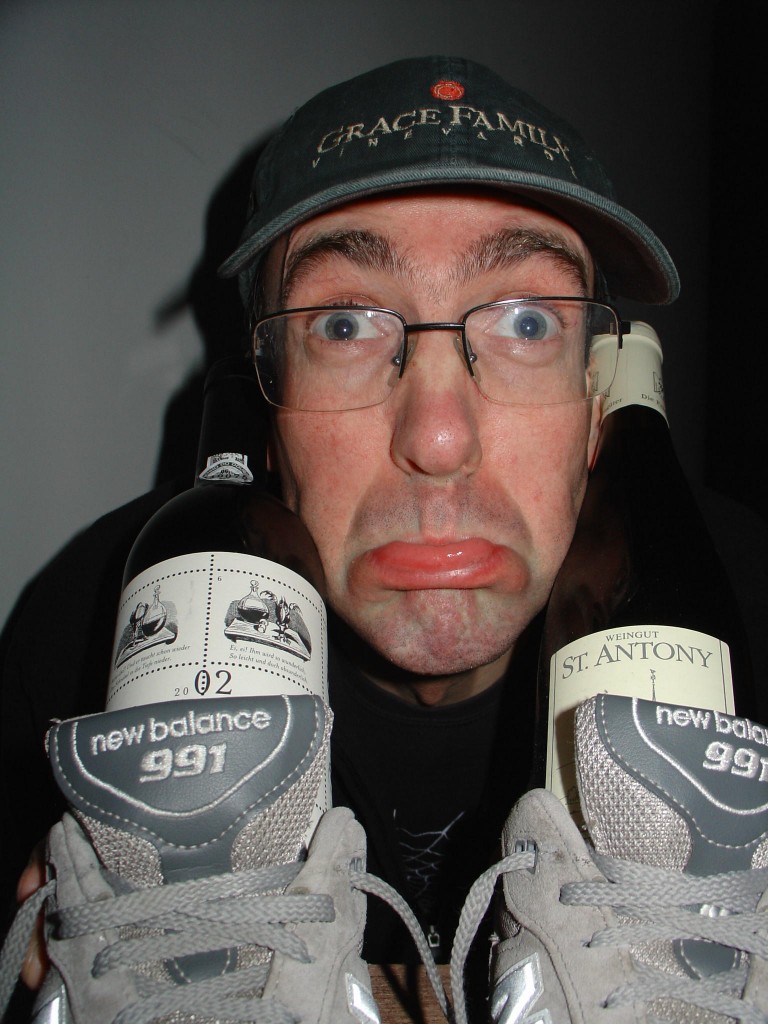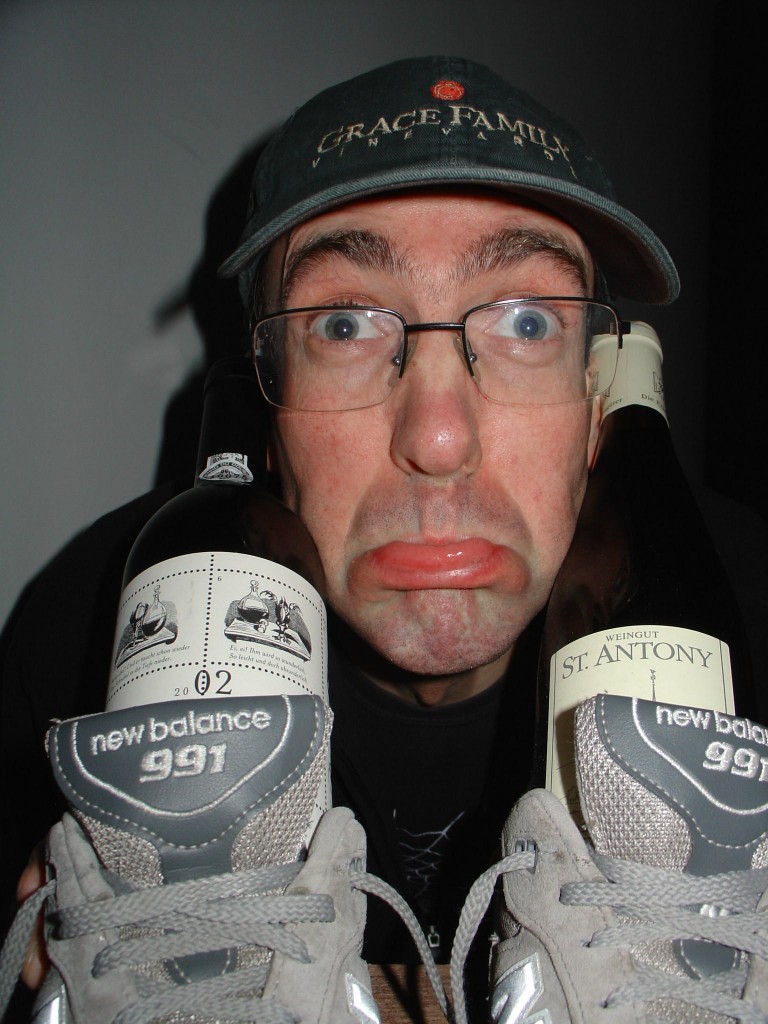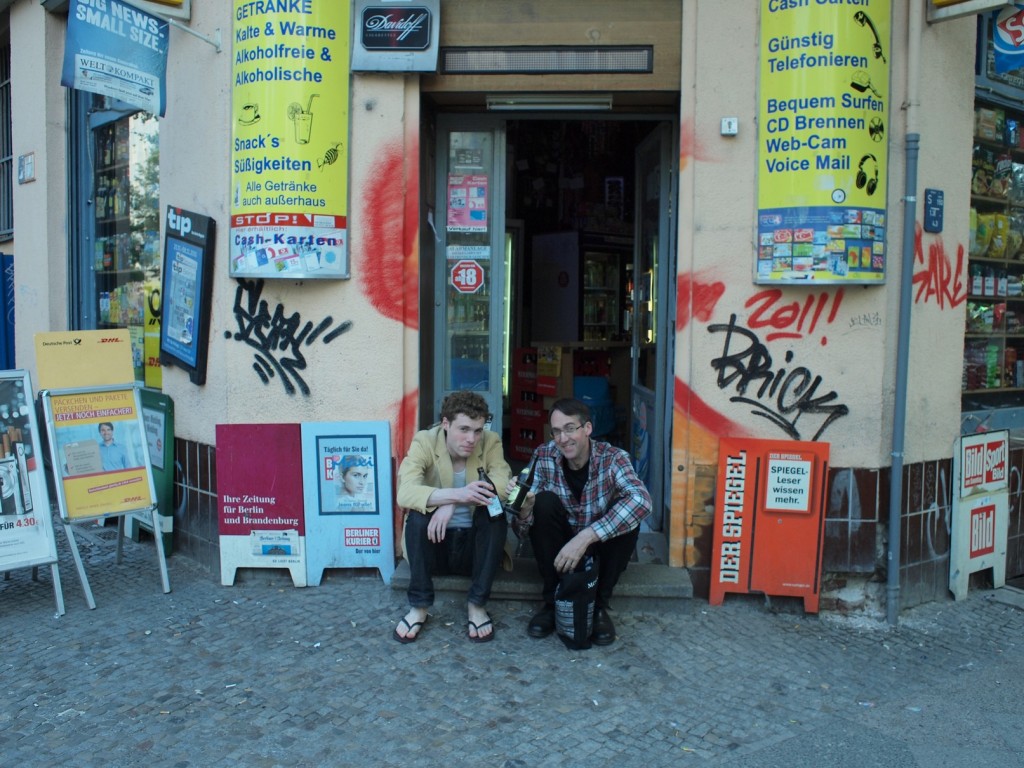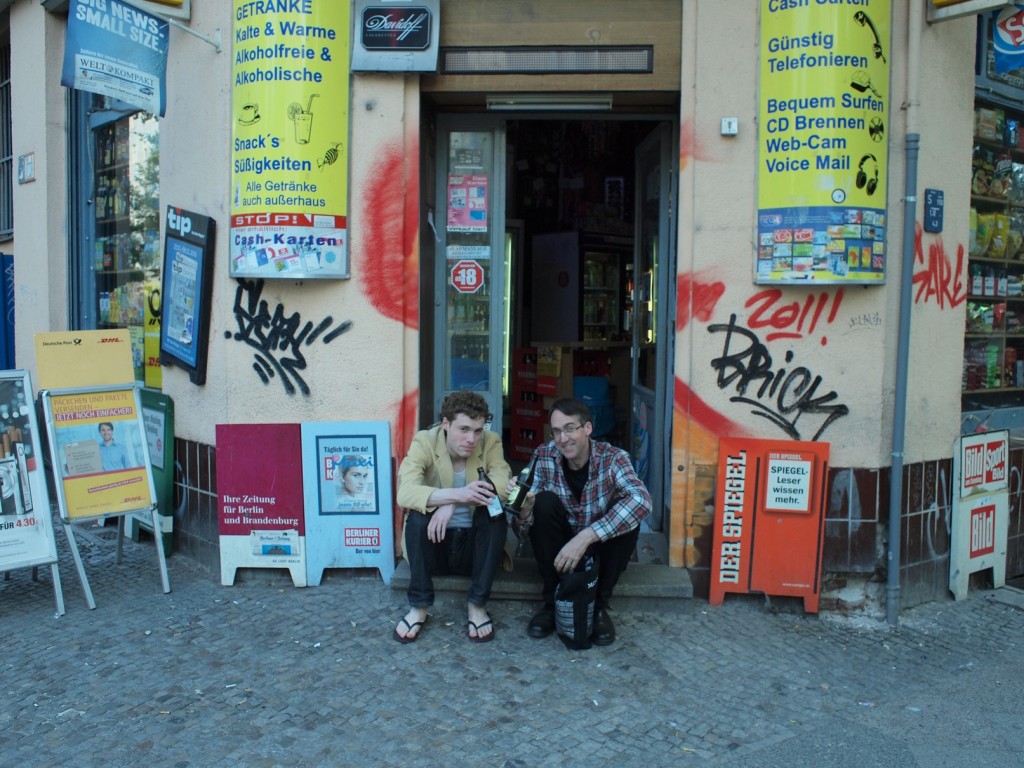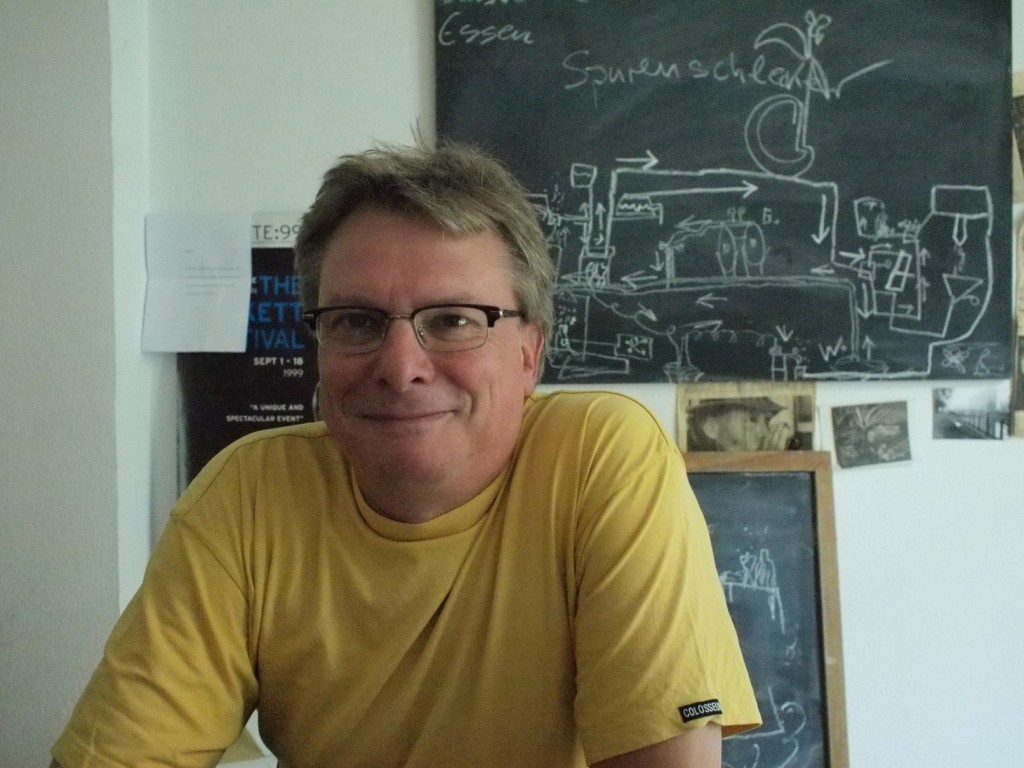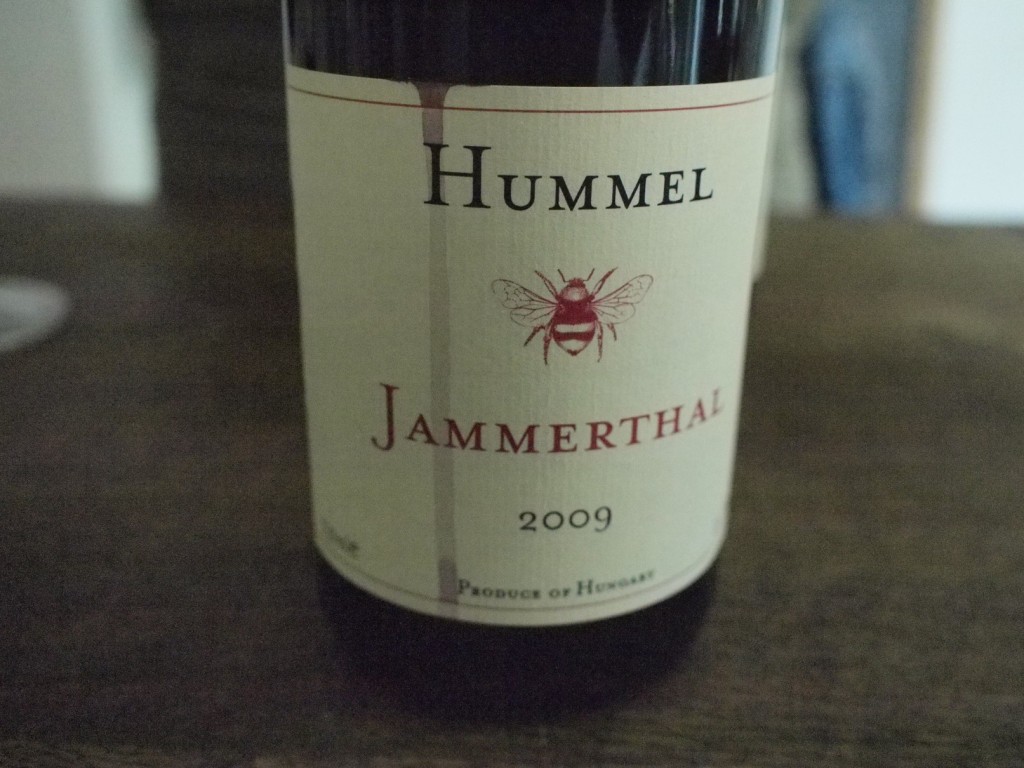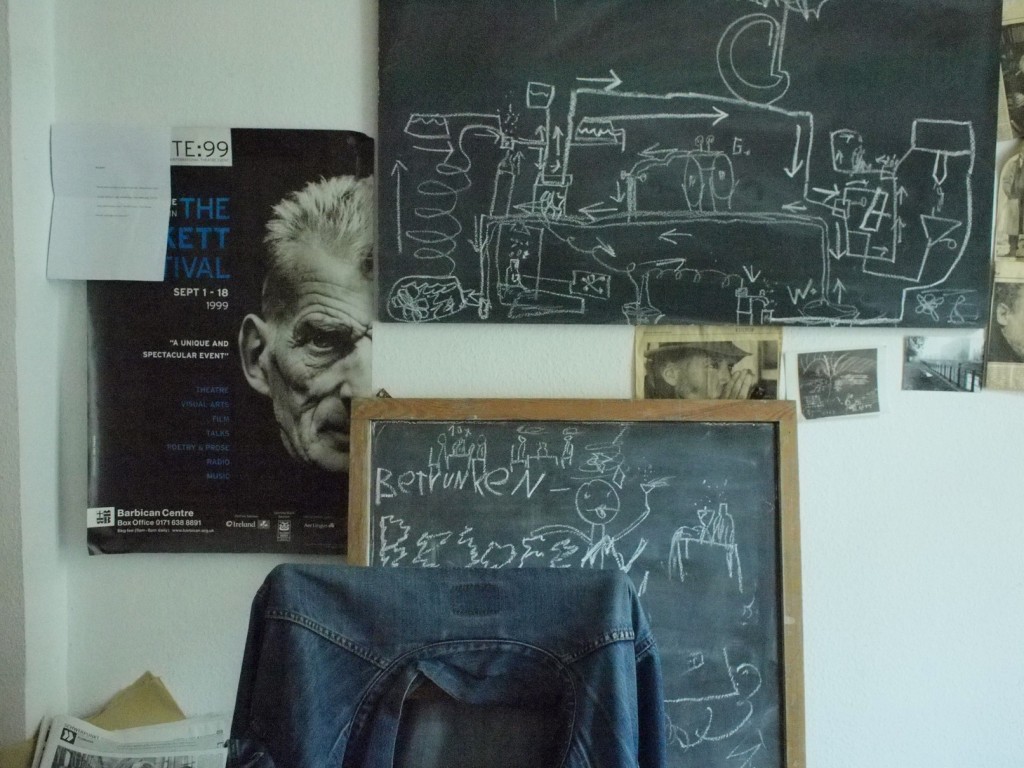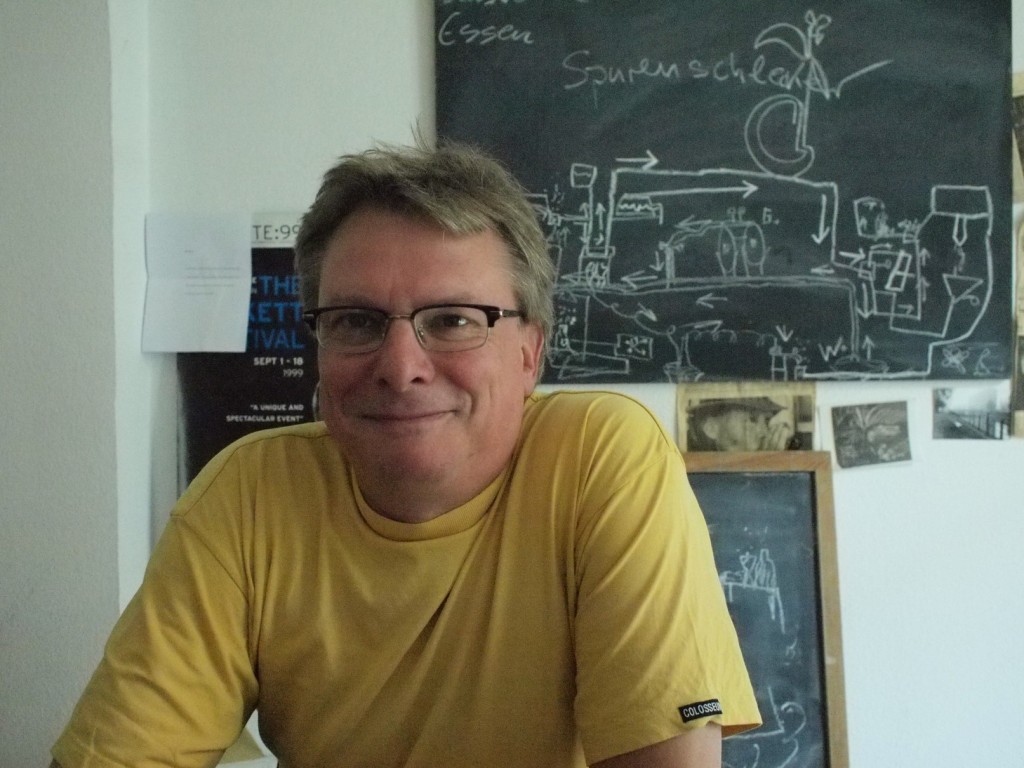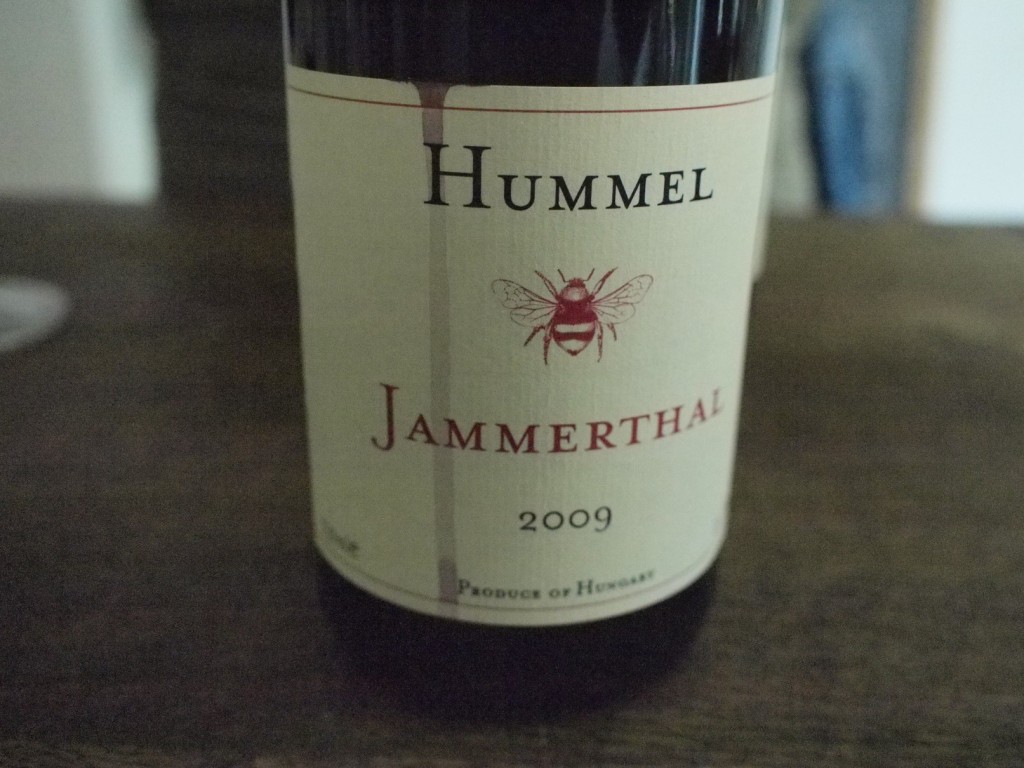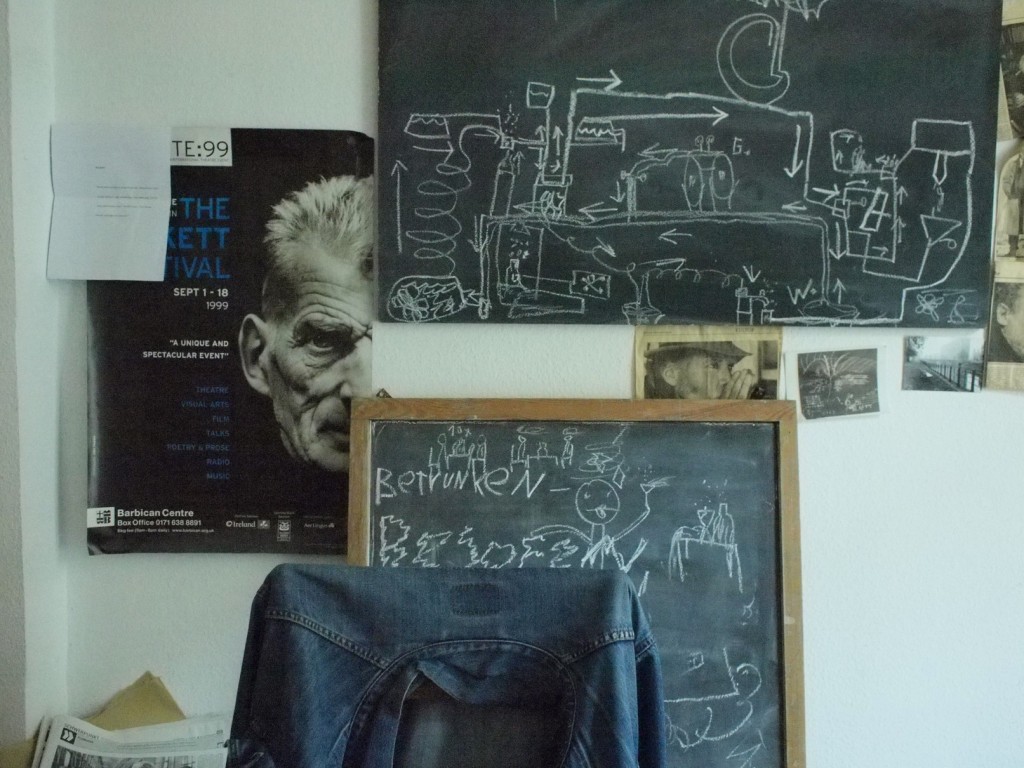EPISODE 4
Like the other Rebels fighting the Empire I, Han Solo, also ask myself who the evil Emperor really is. The question is of vital importance, for it is he that directs Darth Vader, or Kurt Beck Minister President of Rheinland Pfalz, along with the deluded members of the Green Party who have fallen under the influnce of the Dark Side of the Force ? Is the emperor really a small wizened figure resembling a hooded monk or does he look completely different ? A rumour recently spread like wildfire through the German Wine Galaxy that he is actually what the Germans call a „Kaufmann“, which can be translated as merchant, salesman or dealer. When I heard this I couldn’t help thinking back to the peculiar events of the evening of Friday, May 8th 2001.
That night I parked the Millenium Falcon on Planet Ahr just south of Bonn in order to gather samples of a rare red wine called Frühburgunder. After a long day spent sampling this wondorous wine I stepped into the most popular bar in this spiral arm of the galaxy and found one of the Keepers of the Frühburgunder Garden, Werner Näkel of Weingut Meyer-Näkel, with three guess at a corner table. He asked me to join them, but two of his guests quickly left, then the remaining one introduced himself as King of the Union of Concrete Planets. A strange creature from an economic system unknown to me, he cooly added that his Union would be the suppliers of the concrete for Vader’s Death Star, that is the Mosel Bridge.
I am no Jedi Master like Obi-Wan Kenobi, so I have to summon all my self-control to tell him that I would not speak of this matter at all that evening, since otherwise there would be strife between us, which would be disrespectful to our exalted host. However, the Keeper of the Frühburgunder Garden immediately grasped his metaphorical laser sword and attacked the leader of the Union of Concrete Planets, telling him that you only know what it is really like to live in the shadow of a Death Star when one suddenly appears in your own solar system. With icy cool, the King of the Concrete Planets pretended that the Keeper of the Frühburgunder Garden had said nothing of any consequence, but maybe it is all of no consequence to him, because he lives and works far from where Vader is planning to build his Death Star.
Later the King of the Concrete Planets became bizarrely friendly towards me though I am one of the most militant Rebels. Did he imagine he could buy my aquiesence with flattery ? Or was he considering offering me something more substantial for defecting from the Rebels to the Empire ? Perhaps he only wanted me to help him clear his conscience by telling him that in spite of his concrete support for Vader he is still an honourable person ? Which it was I really couldn’t tell, so strange was the behaviour of the alien creature sitting opposite me. As strange as this close encounter of the third kind was, it didn’t convince me that the King of the Concrete Planets is the Emperor, even though he would obviously benefit enormously from the Death Star’s construction.
If he isn’t the evil genius behind the imperial masterplan though, then perhaps the emperor is a yet more powerful „Kaufmann“ hiding on a dark heavenly body close to the media planet SWR, in the Mainz area, home of the uncompromising Wookiees. After their excellent „Frontal“ report on the Mosel Bridge was broadcast, the investigating Wookiees abruptly and inexplicably ended their investigation of Vader’s Death Star plans. Only an enormous gravitational force at very close range could have caused the Wookiees search for truth to suddenly disappeared as if into a black hole.
When I heard the rumours about the Emperor I also thought of the mysterious Imperial Department of Sexual Transportation – a very strange form of motion which has nothing to do with conventional transportation – a department which legend says only a Jedi Master could penetrate from outside. I am not thinking of normal sexuality either, but the lust of steel for concrete and their union as reinforced concerete. It is these forces, steered by the Emperor, which threaten the famous vineyard sites of Zeltingen, Wehlen, Graach and Bernkastel and could eventually destroy all the famous vineyards in the German Wine Galaxy. Help us save them by mailing DEFEAT VADER AND THE EMPEROR to kontakt@pro-mosel.de
EPISODE 3
The other day a message reached me from Yoda, the wise and ancient Jedi master, in this case an organic wine producer in the depths of the Mosel Valley who must remain anonymous, that everything which WEINHIER published so far on the subject of the Mosel Bridge accurately reported the evil situation as he had seen it unfold. Most importantly, he confirmed that the Green Knights had indeed given up their campaign to stop this monstrous construction project after their election success without any discussion, much less a fight. How much did Eveline Lemke want a ministerial post in the State of Rheinland Pfalz and a place in the Imperial Council next to Darth Vader ? Enough to sell her Green principals, the future of the famous vineyard sites between Zeltingen and Bernkastel, plus the tourist industry in this section of the Mosel Valley down the river. Proof enough that she switched over to the Dark Side of the Force.
Of course, its the vineyards which particularly interest WEINHIER, but we are not immune to the wider political dimensions of all this. I mean, if the Greens of Rheinland Pfalz are capable of doing a 180° turn on a major issue which commits them to a policy of enviromental destruction based on voodoo economics, then you have to ask if the Greens are capable of this kind of betrayal on a national level too. To put it bluntly, is there any issue upon which we can trust them not to do a spectacular U-turn like this on ? It was this question which I addressed to Renate Kunst, the Green leader I know best, in my Wine Telegram 126 on ?????, but unfortunately I got no answer. So I repeat it here. RENATE KUNAST, PLEASE TELL US WHICH SIDE YOU’RE ON, Eveline Lemke and Darth Vader’s or that of this unique environmental, agricultural and cultural asset.
Then there is the issue of the cost. When Eveline Lemke defends her unscrupulous actions by saying the reason the Mosel Bridge couldn’t be stopped was the horrendous fines Rheinland Pfalz would have to pay for cancelling the project she deliberately only considers one set of costs. What about the loss of business for the hotels and restaurants in the immediate area of the bridge during the construction period (7 years on paper, but almost certainly much longer in fact) and after ? Some may well go brankrupt, but even they will recieve no compensation from the state. Again and again the local winegrowers have pointed out how they fear the road on the Hunsrück end of the bridge will negatively affect the water-supply in the those great vineyards mentioned above. In a hot dry year, that could mean a loss of both quantity and quality. These very real costs do not seem to interest Eveline Lemke at all, because it is the winegrowers who will pay them, not Rheinland Pfalz. By the time the state picks up the tab for long-term effects like depopulation and the abandonment of vineyards she will have moved on. Eveline Lemke, if you think all this is absurd, then I regret to say that you don’t undertsand the first thing about ecology and economics. Maybe you are already on your way to becoming the next Darth Vader.
Having just returned from Planet New York I can confirm that friends of Mosel Riesling on the other side of the galaxy continue to be as incensed about this issue as the thousands of people on the Mosel who voted for the Greens on 27th March (including 75 on tiny Ürzig, one of the most arch-conservative planets in the universe). WEINHIER is not trying to whip up hatred, but to ask the questions an intelligent 10 year old who just had his first sip of Wehlener Sonnenuhr would. Ever since the episode with the emperror’s new clothes politicial leaders hated this kind of comment, but we consider it essential if something resembling democracy is to be preserved.
I, Han Solo, just climbed in my Mellenium Falcon and travelled through Hyperspace to the Mosel Valley in order to evade the Imperial starships. Wish me luck on my secret mission to stop the Mosel Bridge by sending MAY THE FORCE BE WITH YOU to the rebell HQ at kontakt@pro-mosel.de
EPISODE 2
Darth Vader, the politician perviously known as Kurt Beck, had good reason to puff himself with pride as he announced the coalition contract for the new Imperial Council of the German state of Rheinland Pfalz the other day. With a flick of his laser sword he turned the prospect of defeat at the hands of the Green Knights into a tactical victory for his evil Galactic Empire. By what vile trick did he manage to cling to his position as „Führer“ ? After inviting the leading Green Knights to climb into bed with him for a spot of old-fashioned political prostitution he offered them important positions in his evil Empire. Eveline Lemke went over to the Dark Side in return for the job of minister for the economy, transport, agriculture and winegrowing. This ruse also had an interesting side-effect. Since Beck became Vader his erstwhile SPD red has steadily browned. I’m not talking about boring old Nazi-Brown, but a murky brown that has now gained a green shimmer more appropriate to our dark age.
That the Green Knights of Rheinland Pfalz are not the Jedi they claimed to be is now plain for all to see on their own website. The reason they give there for caving in to Vader’s demand that construction of his Death Star, the monstrous Mosel Bridge, continue is the „horrendous compensation payments“ that Rheinland Pfalz would have to pay to construction companies, and the companies supplying the steel and concrete if the project was cancelled. Also for the Green Knights Money makes the Galaxy go round. Those under the sway of the Dark Side of the Force always portrayed money as an honourable reason to destroying beautiful things like this famous section of the Mosel Valley along with the world-class Riesling vineyards there and the livelihoods of thousands of inhabitants of the Mosel Valley. Bizarrely, having just put the Empire’s finances before the Mosel environment and it’s people, the Green Knights also claim on their website that, „now, as then, we stand on the side of the opponents of this pointless and costly project“. They still want us to believe they’re real Jedi Knights !
They no doubt hope that I, Han Solo, along with the other Rebels under the leadership of Princess Leia, or Sarah Washington, will become docile subjects of the evil Empire. We can’t do that, because we remember Eveline Lempke’s own words about the Mosel Bridge of 19. August 2010: „Minister President Beck and Minister [for the economy, etc.] Hering must finally distance themselves from this ecologicaly and economicaly damaging project. The Mosel Valley lives from winegrowing and tourism, not from lorries rushing over and past it.“ Now we demand that Ministerin Lemke must finally distance herself from this ecologically and economicaly damaging project, otherwise she makes herself an accessory to Vader’s work of enviromental destruction economics. I’d call that very bad karma indeed.
The evil force that resides in reinforced concrete claims another victim and we rebels must confront a new enemy, but we have no fear, for we know that THE FORCE IS WITH US. Please email these words to the rebel leadership at kontakt@pro-mosel.de.
We’ve been asked the question why WEINHIER is getting mixed up in this „political“ struggle. The answer is that it is necessary to become politicall active when so many great vineyard sites between Zeltingen to Bernkastel are fighting for survival. For those who think only in money terms it would certainly be possible for a clever young economist to calculate their value, but their cultural value for Germany and Planet Wine are greater still. If the Wehlener Sonnenuhr can be sacrficed to political egoism and short-term profits for suppliers of steel and concrete today, then tomorrow the best vineyards of another regions will be threatened. Everything which has to do with wine ultimately, even the cool new internet community this site will shortly become, depends ultimately on vineyards. It is a matter of principal: the safekeeping of nature/God and man’s creation, or it’s mindless destruction.
EPISODE 1
Like everything else in this world steel and concrete have a Light Side and a Dark Side and it is important to remember this. There’s plenty of modern architecture, such as the Chrysler Building in New York or the new German Chancellor in Berlin, in which reinforced concrete shines. But during the last years an evil force which resides in these materials has been spreading its influence ever further.
At first it seemed as if Kurt Beck, Minister President of the German state of Rheinland Pfalz, was just another arrogant, patriarchal politician with a mild case of the Sun King Syndrome. Then he fell under the influence of the Dark Side and suddenly, in spite of continuing with the practiced smiles, waving to the crowd and self-important speeches, he became Darth Vader.
Many of those in the inner circle of the politician previously known as Kurt Beck struggle to maintain the illusion that their lord and master has not been taken over by an evil force which resides in steel and concrete, but in their hearts they all now it is true. None is more torn between the Dark Side and Light Side of reinforced concrete than Hendrik Hering, the not quite Luke Skywalker of our tale, whose only wish was to follow in his political father’s footsteps, but now knows only too well that it is Darth Vader he is serving.
Under Princess Leia, also known as Sarah Washington, the rebels gathered on Planet Uerzig to plan their attack upon the great evil threatening the valley, the Hochmoseluebergang or Mosel Bridge, Vader’s Death Star. Vainly the rebels tried to win Hering over to the Light Side of the force, that is for the protection of environmental and cultural assets, for sane economic policies, but his greed for power was too great and he fell ever deeper under the influence of the Dark Side.
The people of Rheinland Pfalz would have realized how their leader had been turned by the evil in steel and concrete much earlier if their journalists had not fallen also under Vader’s spell. Only days ago it become clear just how dangerous the Dark Side really is.
When the Green knights who fought so hard and long with the rebels surprised all by storming the parliament of Rheinland Pfalz it seemed that Vader’s power had been broken, but this victory turned out to be hollow. Immediately they had entered the Landtag in Mainz the Greens bowed down before Lord Vader and let him take them all from behind, savouring the pleasure.
I, Han Solo, write this from the other side of the galaxy where the people received this news with consternation and dismay. “How can that be ?” they ask me, “how can Greens agree to this environmental destruction and accept the policy of voodoo economics behind it ?” I reply that though the Empire strikes back, they forget the true Power of the Force.
Shortly I will climb in my spaceship, the Millenium Falcon, and rejoin the rebels. We shall destroy the Death Star and if Vader is on board then him with it. Show your support by mailing kontakt@pro-mosel.de the message MAY THE FORCE BE WITH YOU.

![the_emperor [1600x1200]](http://www.stuartpigott.de/wp-content/uploads/2011/06/the_emperor-1600x1200.png)
![green-death-star [1600x1200]](http://www.stuartpigott.de/wp-content/uploads/2011/06/green-death-star-1600x1200.jpg)
![evil-mosel-princess [1600x1200]](http://www.stuartpigott.de/wp-content/uploads/2011/06/evil-mosel-princess-1600x1200.jpg)
![darth-mosel-hires [1600x1200]](http://www.stuartpigott.de/wp-content/uploads/2011/06/darth-mosel-hires-1600x12001.jpg)
![31122008010 [1600x1200]](http://www.stuartpigott.de/wp-content/uploads/2011/06/31122008010-1600x1200.jpg)
